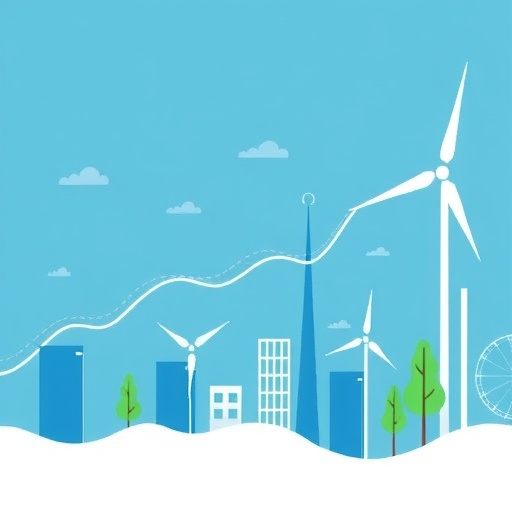In recent years, the need for effective carbon reduction strategies has reached unprecedented urgency, driven by the alarming impacts of climate change and the growing global consensus on the necessity of sustainable development. The integration of advanced decarbonization technologies has emerged as a focal point of research and innovation in the quest for a greener future. The paper titled “Recent advances in decarbonization technologies for sustainable development” by GaneshKumar et al., published in Environmental Science and Pollution Research, sheds light on the remarkable advancements in this domain, examining both the methodologies employed and the potential implications of these technologies on our environment.
Decarbonization refers to the process of reducing carbon dioxide emissions in various sectors, primarily through the transition from fossil fuels to renewable energy sources. This multifaceted approach encompasses a range of strategies, including carbon capture and storage (CCS), renewable energy implementation, and energy efficiency improvements. The findings presented in this paper underscore that the path to sustainability is paved with innovative technologies designed to mitigate greenhouse gas emissions while promoting economic growth.
One of the cornerstone technologies discussed in the paper is carbon capture and storage. CCS involves capturing carbon dioxide from emission sources, such as power plants, and subsequently storing it underground or utilizing it in various industrial processes. The authors emphasize that advancements in CCS technology have improved its efficiency and lowered operational costs, making it a viable option for many industries grappling with stringent emission regulations. The developments in this area also raise crucial questions about the scalability of CCS and its integration into existing infrastructure.
The role of renewable energy in decarbonization cannot be overstated. As highlighted in the study, investments in solar, wind, and hydroelectric power have skyrocketed in recent years, positioning these technologies as vital components of the global energy transition. The economic viability of renewables has greatly improved due to advancements in technology, streamlined production processes, and enhanced grid management systems. Consequently, renewable energy has become a cornerstone solution in the fight against climate change, enabling nations to reduce their reliance on fossil fuels and decrease carbon emissions effectively.
Another crucial aspect of the decarbonization discourse revolves around energy efficiency. The paper delves into innovative approaches aimed at optimizing energy use across various sectors, including residential, commercial, and industrial applications. By implementing energy-efficient technologies such as smart grids, advanced insulation materials, and high-efficiency appliances, organizations can drastically reduce their energy consumption and, consequently, their carbon footprint. Additionally, the authors advocate for significant investments in research and development to drive further innovations in this field.
The study also explores the interdependency between decarbonization technologies and sustainable development goals (SDGs). The authors argue that the convergence of technological innovation and sustainability is pivotal for accomplishing targets related to climate action, clean energy, and sustainable cities. By prioritizing renewable technologies and energy efficiency, countries can unlock new economic opportunities while simultaneously addressing the pressing challenges of climate change and resource depletion.
Furthermore, the paper highlights the role of government policy in accelerating the deployment of decarbonization technologies. Effective regulatory frameworks and financial incentives are crucial for promoting research and development, facilitating technology transfer, and encouraging private sector investment. The authors assert that collaboration among governments, industries, and academic institutions will be vital to overcoming the barriers that hinder the widespread adoption of these solutions.
In addition to the technical advancements, public awareness and engagement are essential components of the decarbonization narrative. The paper discusses how community involvement and education initiatives can foster a culture of sustainability, motivating individuals and organizations to embrace energy-efficient practices. By raising awareness about the benefits of decarbonization technologies, stakeholders can create a supportive environment conducive to sustainable development initiatives.
Moreover, the challenges posed by the transition to a low-carbon economy cannot be overlooked. The authors outline common obstacles, including technological limitations, high upfront costs, and resistance from traditional energy sectors. Nevertheless, they maintain that the long-term benefits of adopting advanced decarbonization technologies far outweigh the immediate hurdles. Policymakers and businesses alike must remain committed to identifying solutions that will enable a smoother transition while safeguarding economic stability.
As the focus on decarbonization grows, researchers must continue to collaborate within diverse fields to foster innovative solutions that cut greenhouse gas emissions. This interdisciplinary approach is paramount, as it yields breakthroughs that can be tailored to specific local needs and contexts. Through collaboration and knowledge sharing, researchers can expedite the development of effective decarbonization technologies.
The future of decarbonization technologies holds tremendous promise. The advancements detailed by GaneshKumar et al. illustrate that a wide array of tools are at our disposal, waiting to be fully harnessed. From improving the efficiencies of renewable energy systems to refining carbon capture techniques, the breadth of innovation in this field is expansive. It beckons an urgent call for governments, industries, and communities to act decisively in pursuit of sustainable development.
In conclusion, the paper sheds light on the pivotal role of recent advances in decarbonization technologies as we face the numerous challenges of climate change and environmental degradation. As these technologies evolve and gain traction within the global economy, they will undoubtedly play a vital role in achieving a sustainable future. The integration of new methods and innovations will be instrumental in steering us towards a world where economic growth does not come at the expense of our planet’s health. Decarbonization is not merely a goal but an imperative, reinforcing the trajectory towards sustainable and resilient systems that prioritize both people and the planet.
Subject of Research: Recent advances in decarbonization technologies for sustainable development.
Article Title: Recent advances in decarbonization technologies for sustainable development (RADTSD-2023).
Article References: GaneshKumar, P., V.S., V., Prabakaran, R. et al. Recent advances in decarbonization technologies for sustainable development (RADTSD-2023). Environ Sci Pollut Res (2025). https://doi.org/10.1007/s11356-025-36777-7
Image Credits: AI Generated
DOI: 10.1007/s11356-025-36777-7
Keywords: decarbonization, carbon capture, renewable energy, sustainable development, energy efficiency, climate change.




